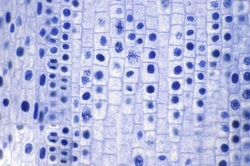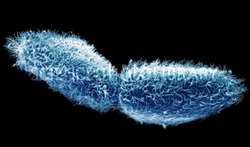Why do Cells divide?

Cell division happens in all organisms. Cell division takes place for different reasons. For example, single-celled organisms reproduce through cell division.
In multicellular organisms, cell division is involved in
growth, development, and repair, as well as reproduction.
In multicellular organisms, cell division is involved in
growth, development, and repair, as well as reproduction.
|
Reproduction
Cell division is important for asexual reproduction, which involves only one parent organism. In single-celled organisms, the parent divides in two, producing two identical offspring. In single-celled and some multicellular organisms, offspring result when a parent organism buds, producing offspring. In multicellular organisms, reproduction by cell division can include plant structures such as runners and plantlet. |
Growth and Repair
One characteristic of all living things is that they grow. You are probably bigger this year than you were last year. Your body is made up of cells. Although cells themselves grow, most growth in multicellular organisms happens because cell division produces new cells. Cell division also produces cells for repair. If you cut your hand or break a bone, the damages cells are replaced by new cells that form during cell division. |



